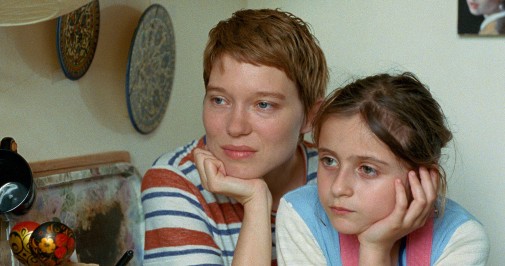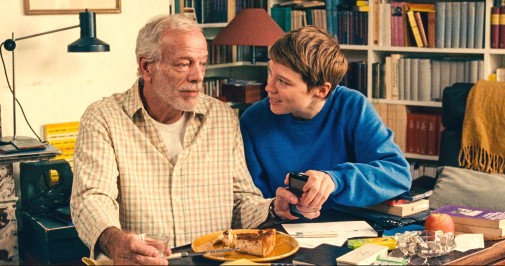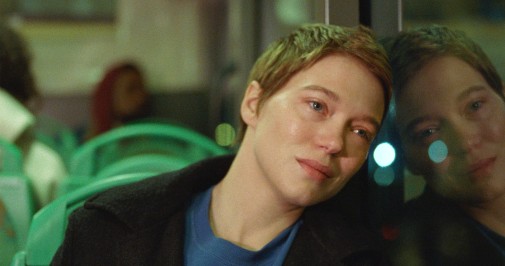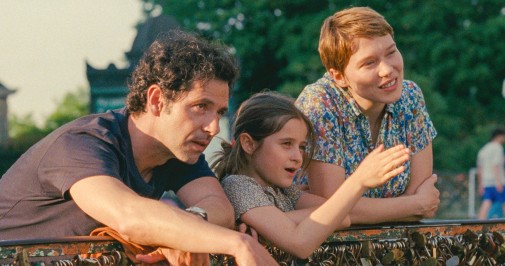
Autofiction isn't a new phenomenon, whether in film or other arts. Nevertheless, more and more directors are dipping their toes into pools of navel-gazing introspection. For some auteurs, however, there has never been another way of making art. Take Mia Hasen-Løve as an example. Her cinema has always manifested as a reflection of lived experience, pulling from personal details in gradations of openness, extrapolating narrative honesty as a conduit for building humanistic pieces. Empathy is the tenet of her cinema, not just between audience and characters but between the filmmaker and her creation. At least, that's the feeling that persists after one leaves the theater, still dazed by the director's work.
Within this context, it means a great deal to state that One Fine Morning, Mia Hansen-Løve's latest, might be her most personal project to date…

If one wanted to be highly systematic, perchance a bit limited or even cold, it's possible to categorize this film as the director's ode to her father in a similar manner that past works felt connected to other relationships. Reading interviews and following Hansen-Løve's career, one comes to recognize her DJ brother in Eden, her Philosophy teacher mother in Things to Come, and her erstwhile filmmaker partner in Bergman Island. These stories are not direct representations of real-life, just refractions of it in the wonderland of cinema, rhyming ideas echoing from work to work. Unmoored people trying to catch their breath as life unfolds are a constant, time's cruelties providing violent shake-ups while the pain of absence is a background ache.
But of course, amid the despondence, there's always hope. Anyone's time on earth is a mix of tonalities rather than one monotonal thing. Balancing sorrow and joy, heavy hearts with a light fluttering, the director captures the complexity of being alive, both the mundane and the poetic parts of it. Moreover, her characters feel like entities who branch out beyond these narrative framings, their day-to-day existence shaped by the anti-narrative aimlessness of reality. All these aspects are present in this One Fine Morning, the memoirist themes mentioned before, together with the thematical stones forming the foundation for this particular personal oeuvre.
Ungenerous viewers may accuse the director of traveling through a well-trodden path, verging on repetition. However, that would be too reductive a reading. If nothing else, the characterizations are so specific to this work as to sustain and justify Hansen-Løve's approach. Our protagonist is Sandra, a young widow and single mother who works as a interpreter in Paris, negotiating different facets of her life as the film unravels before her. Indeed, two stories intertwine in One Fine Morning, neatly separated until the final moments if you ignore the melancholic connective tissue bringing them together from the beginning. Notably, each thread centers on Sandra's relationship with a man – her father on the one hand and her lover on the other.
Georg is dying, succumbing to a degenerative disease that, in half a decade, turned him from a charismatic teacher into a man who can scarcely take care of himself. Sandra helps where she can, as does a network of other loved ones, but it's not enough. Slowly, premature dementia is erasing the man, leaving behind what seems like a confused hollowness until sparks of lucidity bring back memories of what once was. For someone who has endured similar experiences in my life, watching as family members fade away though their body is still present, Sandra's relationship with her father proved to be a devastating experience.
So many moments ring true, from small domestic rituals to the growing gulf between people, feelings of paralyzing powerlessness in the face of ineffable forces. As Parisian summers give in to winters spent far away, a picaresque journey through care facilities delivers the gentlest of gut punches until all that's left to do is the practical matter of separating old possessions and emptying an apartment that's no longer a home. In one profound interaction, Sandra muses about how her father's sprawling book collection is a better manifestation of him than the person himself, for, in the objects, one can grasp the mind mostly gone.

Another look into totemic items uncovers a notebook imbued with Georg's pain, his situation poignantly expressed in pages of crescent chaos. Yet another moment finds the patriarch recoiling from the past in a way antithetical to Sandra's treasuring of physical remembrance. When she plays some of his favorite CDs, he's almost frightened, for they are too laden with memories, which only brings about frustration with the present. Returning home on a night bus, those words still storm inside Sandra's head, invisible storms that become visible as her face breaks apart in tears. Maybe she's just lost in grief, and maybe she's asking herself tough questions. Is it selfish to mourn the father you remember while he's still here, dying but alive for now and present in his own way? Maybe – Sandra is not someone unmarked by selfish wants, after all.
That's the other thread weaved through the film's tapestry, a reckless affair with an old friend, now married to another woman we never see. Mia Hansen-Løve refuses to judge the characters or fall into moral didacticism. Instead, she allows their complicated humanity to shine on-screen, ugliness holding hands with beauty, reason caught in an embrace with folly. At the end of the day, everyone's just trying to find happiness, be it a long-term serenity or a momentary respite from immediate aches. Their feelings are valid, their bruised souls dictating editing patterns that privileged aborted moments and quick transitions, cascading emotions in swift cuts. Marion Monnier's work is exemplary, but so is Denis Lenoir's lensing, full of Rohmerian touches in its seasonal imagery, color stories and soft light.
Still, if I were to select MVPs from within this film's team of superlative artists, the acting ensemble would be where to look. Nicole Garcia is a dream as Sandra's mother and Georg's ex-wife, finding tenderness in a no-nonsense attitude that sometimes leans acerbic. Melvil Poupaud is a fascinating figure of contradicting desires as the married paramour. At the same time, Pascal Greggory delivers a disconcerting portrayal of someone that's like a drawing in the process of being erased. Finally, there's Léa Seydoux in what could be called the best work of her career. From beginning to end, she's miraculous, finding infinite ways of articulating Sandra's personhood, from peaks of carnal euphoria to dark valleys of grief. Even if you're not a fan of Mia Hansen-Løve's cinema or find this particular story inconsequent, you owe it to yourself to witness Seydoux's subtle genius.

One Fine Morning is currently in theaters, enjoying a one-week limited release by Sony Pictures Classics.